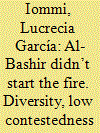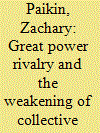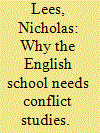|
|
|
Sort Order |
|
|
|
Items / Page
|
|
|
|
|
|
|
| Srl | Item |
| 1 |
ID:
177736


|
|
|
|
|
| Summary/Abstract |
This paper contends that despite it functioning as a catalyst, the ICC “Africa problem” did not start with the arrest warrant against al-Bashir. To fully comprehend the current legitimacy crisis we must understand the nature of the negotiation process that led to the adoption of the Rome Statute and its enduring impact. In particular, we must acknowledge the uneven ability of states to formulate and signify their preferences on the basis of their identity and interests during the negotiation process. Drawing from Wiener’s theory of contestation, the paper contends that the absence of meaningful engagement with issues germane to some ICC stakeholders before and during the Rome Conference facilitated the adoption of the Rome Statute, but also plausibly created difficulties for the Court in the long run. Specifically, it postponed unavoidable conflict over contentious issues and undermined the likelihood that specific stakeholders would develop a sense of ownership over the Statute.
|
|
|
|
|
|
|
|
|
|
|
|
|
|
|
|
| 2 |
ID:
177732


|
|
|
|
|
| Summary/Abstract |
As Russia-West relations hit a post-Cold War low and a sterner Western approach toward China has become more manifest, great power rivalry appears to have returned. It is often assumed that these developments will have important consequences for the durability of the so-called ‘liberal international order’. This paper seeks to clarify precisely what the liberal international order is and how it relates to English School understandings of international society and international order. First will come an analysis of these concepts as they are currently understood in recent literature, with the aim of providing a more wide-reaching framework for understanding hegemony and liberal order in today’s world. Then, the paper will turn to Russian and Chinese perspectives on the liberal order and the extent to which Moscow and Beijing are challenging it. Finally, it will discuss the implications that all of this holds for the conceptual relationship between international society and international order.
|
|
|
|
|
|
|
|
|
|
|
|
|
|
|
|
| 3 |
ID:
177733


|
|
|
|
|
| Summary/Abstract |
Despite the global influence of his works during and after his lifetime, Jeremy Bentham is a largely neglected figure in IR. While his utilitarian mode of reasoning and his relentless efforts to change British society have received significant scholarly attention, the same cannot be said of his international writings and his vision of an international order of liberal nations. Bentham’s “global intellectual activism” in promoting legal reform abroad during the 1810 s and 1820 s suggests that the prospect of “exporting” constitutional and representative forms of government was key to this vision. In piecing together Bentham’s mature constitutional theory and his vision of an international order of liberal nations, this paper sheds some light on the historical emergence of a deep-seated assumption that informs much of current debates about the future of the liberal international order: the belief in the moral superiority of liberal democracies and their central role in upholding international order.
|
|
|
|
|
|
|
|
|
|
|
|
|
|
|
|
| 4 |
ID:
177734


|
|
|
|
|
| Summary/Abstract |
This article contributes to the growing literature regarding humor in international politics, focusing on satirical and comedic narratives in the recruitment videos of the British and Swedish armed forces. Although these official recruitment videos – published on each militaries’ respective YouTube channel – are, perhaps surprisingly, often funny and entertaining, there is little research on the roles, functions and employment of humour by actors involved in international affairs. We argue that the methodological apparatus provided by narrative analysis can provide valuable insight, and is a helpful tool for analyzing humourous audio-visual content. We show that the use of humour by the armed forces functions both to camouflage and to insulate, simultaneously obscuring and supporting a process of militarization of everyday life whilst making criticism of the videos’ political messages more difficult.
|
|
|
|
|
|
|
|
|
|
|
|
|
|
|
|
| 5 |
ID:
177735


|
|
|
|
|
| Summary/Abstract |
This article interrogates a tension at the heart of the principle of accountability: accountability as a principle of non-impunity of public officials versus accountability as a form of bureaucratic organisation and control. Although these dimensions are distinguishable in the abstract, their ambiguity has led to an expectations gap among both citizens and elites. The historical legacies of previous policies can exacerbate this expectations gap, leading to a variety of value trade-offs, with the potential to undermine other political values, such as political learning, consensus-building, and citizens' rights. We present examples of the trade-offs resulting from this expectations gap, focusing on moments of crisis in which such trade-offs can be seen most acutely, and highlight its role as a vehicle of global populism.
|
|
|
|
|
|
|
|
|
|
|
|
|
|
|
|
| 6 |
ID:
177731


|
|
|
|
|
| Summary/Abstract |
The English School tradition offers a compelling framework for understanding war as an institution within an international society constructed by states. Nonetheless, analyses of the causes of inter-state insecurity offered by English School scholars are underspecified and fail to develop distinct middle-range theories based on these core insights. These problems can be remedied through an engagement with the subfield of quantitative conflict studies. This pairing of ‘scientific’ and ‘classical’ research traditions seems improbable, but the methodological barriers to conversation can be overcome if claims about the circumstances and causes of war are contextualised historically. Important findings in conflict research vindicate the English School understanding of war as a social institution of an anarchical society and a norm-governed mechanism for resolving disputes between political entities. Further dialogue between these approaches would deepen our understanding of how the global institutional landscape shapes both war and peace.
|
|
|
|
|
|
|
|
|
|
|
|
|
|
|
|
|
|
|
|
|